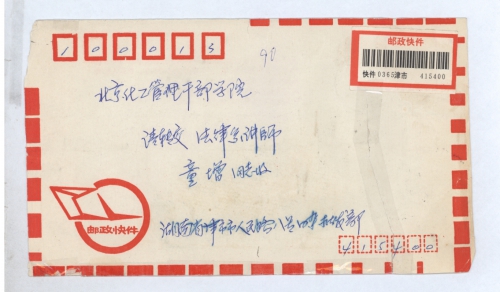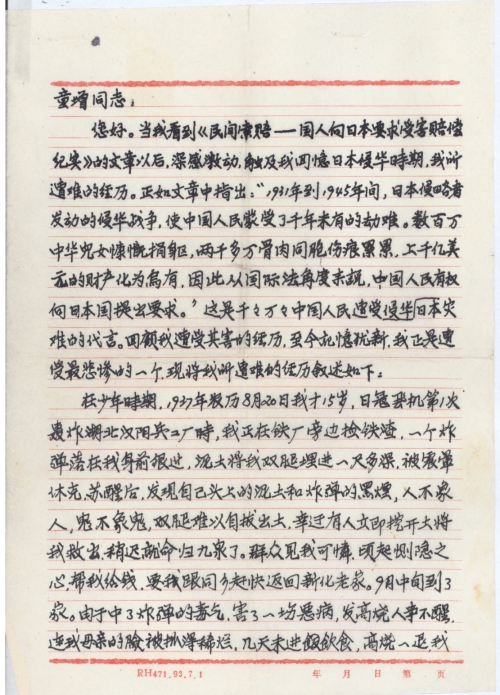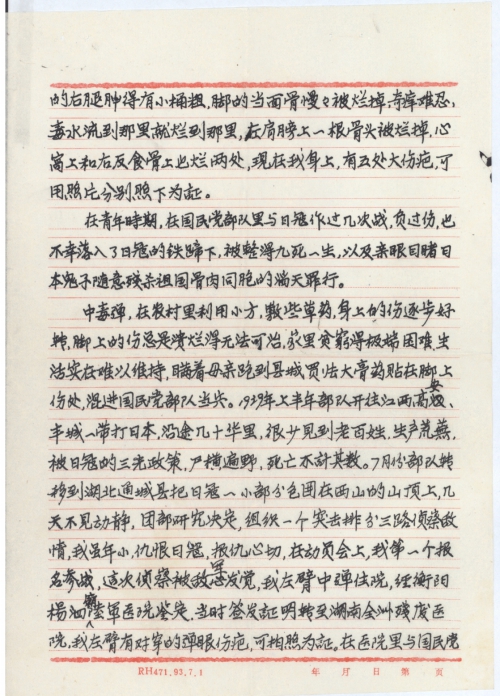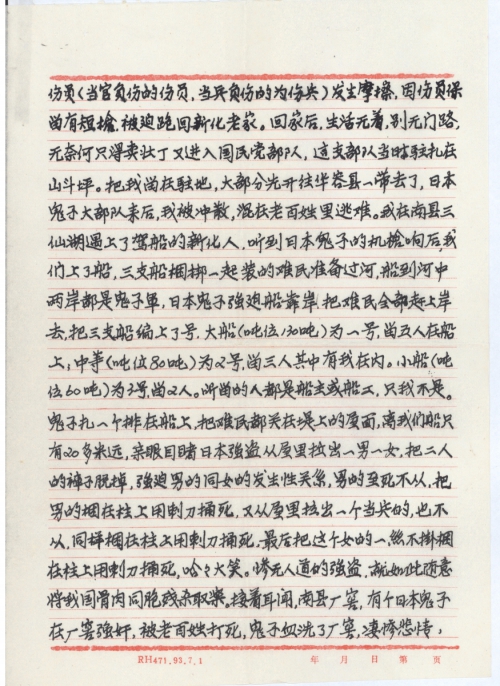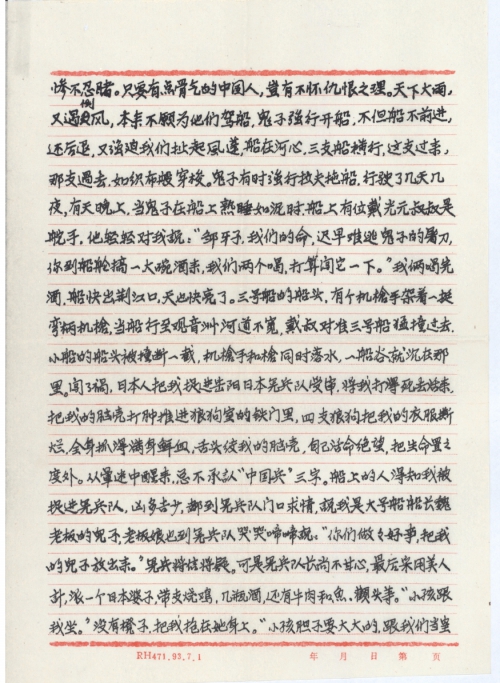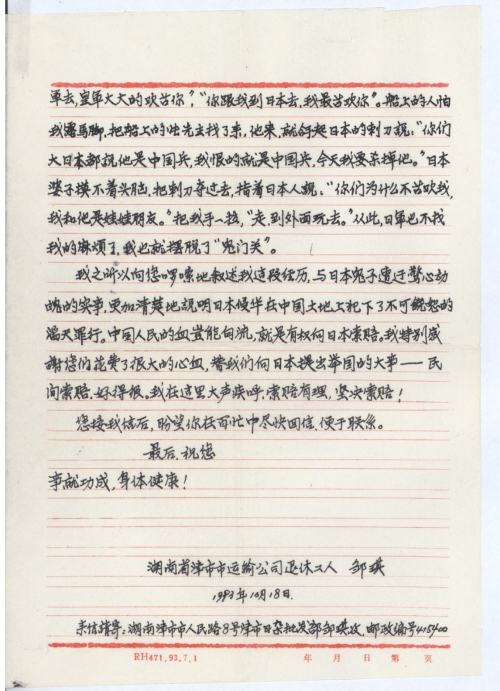Date of letter:1993-10-18
Address of author:Jinshi City, Hunan Province
Date of event:1937-08-20(lunar calendar)
Location of event:Wuhan City, Hubei Province
Name of author:Zou Qi
Name(s) of victim(s):Zou Qi and her mother
Type of atrocity:Air Bombings, Biological/Chemical Warfare, Murders, Rapes(RA, AB, BC, MU)
Other details:In 1937, the Japanese aircrafts bombed Hubei for the first time. I was nearly killed, and my mother was hurt by the gas of bombs, with multiple ulcers. The Japanese soldiers even killed our compatriots for fun. The Japanese army committed unforgivable crimes in China. The blood of Chinese compatriots will not go in vain. We have the right to claim for compensation from Japan.
Comrade Tong Zeng,
I became quite emotional after reading the article entitled “Civil Claim for Compensation: Records of the Chinese People Demanding Damage Compensation from Japan” as it brought back the memories of my suffering during Japan’s invasion of China. As is pointed out by the article, “During 1931 and 1945, Japan’s war of aggression against China brought an unprecedented catastrophe to the Chinese people. Millions of Chinese people died, over 20 million compatriots were injured and property of over USD $100 billion was gone. Therefore, the Chinese people have the right to demand compensation from Japan from the perspective of international law.” This properly describes the disaster that millions of Chinese people have suffered due to Japan’s invasion of China. The memories of my suffering are still fresh to me. I am one of the victims who have suffered the most. The description of my suffering is provided below:
When Japanese planes bombed the munitions factory of Hanyang, Hubei on lunar August 20, 1937 for the first time, the 15-year-old me was picking up iron slag near the ironworks. Suddenly, a bomb was dropped nearby. The dirt flew out and buried my legs over 30 cm deep. I blacked out instantly. After I came to myself, I found dirt on my head, with black smoke rising from my hair due to the bombing, making me look like a ghost, and I couldn’t pull my legs out of the dirt. Luckily, someone ran over, dug open the dirt and saved me. I might have died if help came later. The onlookers sympathized with me, so they pooled some money for me and asked me to return to my hometown in Xinhua as soon as possible with a townsman. Thus, I returned home in mid-September. As I was poisoned by the bomb, I suffered from a serious disease. I had a high fever, lost consciousness, badly scratched my mother’s face, and didn’t eat anything for days. After the fever was gone, my right leg became as thick as a small barrel and began to rot. It was very itchy. Any part of the body the poison flowed to would rot. A bone in my shoulder rotted, along with two bones above my heart. Now my body bears five large scars. I can take a picture as proof.
Then, after I became an adolescent, I joined the Kuomintang army and fought several times against the Japanese army, got injured, and was unfortunately captured by the Japanese army and cruelly tortured. I also saw with my own eyes that the Japanese soldiers freely killed other Chinese people.
After I was poisoned by the bomb, I applied some herbs to the wounds and gradually got better. But the wounds in my feet rotted and couldn’t be cured. As my family was extremely poor, my parents had no money to buy medicine for me. So I secretly went to the county and bought angelica plaster for my wound without telling my mother. After that, I joined the Kuomintang army. In the first half of 1939, my army went to Gao’an and Fengcheng, etc. of Jiangxi to fight the Japanese. I hardly saw common people or crops for several dozen kilos along the way due to the Three Alls policy implemented by the Japanese army. Moreover, there were countless corpses along the way. In July, my army transferred to Tongcheng, Hubei, where we surrounded a small group of Japanese soldiers on the peak of the West Mountain. As the enemy didn’t make a move for days, the regiment decided after research to organize a platoon and divide it into three groups to gather intelligence about the enemy. Although I was young, I was eager to take revenge, so I was the first to sign up for the operation at the mobilization meeting. Unfortunately, our operation was discovered by the enemy. I was shot in the left arm and sent to the Hengyang Yangsimiao Army Hospital, which then issued a certificate to transfer me to Hunan Quanzhou Disability Hospital. I bear a bullet scar in my left arm and can take a picture as proof. In the hospital, I (a wounded soldier) had a conflict with a wounded officer of the Kuomintang army. As wounded officers still had handguns with them, I was forced to return to my hometown in Xinhua. As I had no way to make a living after returning home, I once again got conscripted into the Kuomintang army. My army was then stationed in Shandouping. Most of the soldiers were transferred to Huarong County, while I, among others, was left in the base. Afterwards, a large group of Japanese army came and I got separated from other Chinese soldiers. When hearing gunshots fired by the Japanese army, we got on one of three boats that were tied together. The boats carried refugees to cross the river. But when the boats arrived at the middle of the river, there were Japanese soldiers standing on both banks. They forced the boats to pull over and forced all refugees on to the bank. The Japanese soldiers numbered the three boats. The large boat (weight 130 tons) was numbered 1 and 5 people were left on it. The medium boat (80 tons) was numbered 2 and 3 people, including me, were left on it. The small boat (60 tons) was numbered 3 and 2 people were left on it. All the people who were left on the boat were either boat owner or boatmen, except me. A platoon of Japanese soldiers went on the boats. All refugees were held in a room on the bank, only over 20 meters from the boat I was on. I saw with my own eyes that a Japanese soldier pulled out a man and a woman from the room, took off their trousers and forced them to have sex. The man refused, so the soldier tied him to a pillar and bayoneted him to death. Then, the Japanese soldier pulled a soldier from the room and ordered him to do the same thing. The soldier refused, so he was also tied to the pillar and bayoneted to death. At last, the soldier tied the naked woman to the pillar and bayoneted her to death. Then, he laughed aloud. This was how the cruel Japanese robbers freely killed the Chinese people for fun! I heard that after a Japanese soldier raped a Chinese woman in a pit in Guangjiao, Nan County, he was beaten to death by the local people. Later, the Japanese army raided the pit. It was a horrible incident. Anyone Chinese people with a consciousness will hate the invading Japanese army. Due to heavy rain and wind, we refused to sail the boat, but the Japanese soldiers forced us to. When seeing that the boat went backward instead of forward, the Japanese soldiers forced us to hoist the sail. The three boats wove forward along the middle of the river, with one boat going this way and another boat going another. Sometimes, the Japanese soldiers would capture some Chinese men to tow the boats. In this way, the boats sailed for several days and nights. Then on one night, after the Japanese soldiers fell asleep, uncle Dai Guangyuan, a helmsman, said to me in a low voice, “Boy, we will be killed by the Japanese soldiers sooner or later. Go and fetch a big bowl of wine in the cabin. Let’s drink it and do something risky.” After we drank the wine, the boats were about to leave Jingjiangkou and it was almost dawn. There was a machine gunner with a curved machine gun at the front of No. 3 boat. When the boats reached Guanyinzhou, where the river was narrow, Uncle Dai precisely crashed our boat at No. 3 boat. A segment of the front of the small boat was broken and the machine gunner fell into the river along with the gun. As I made trouble, the Japanese captured and sent me to the Japanese Kempeitai of Yueyang for interrogation, where I was so badly beaten that my head swelled. Then, the Japanese pushed me into a dog house, where 4 dogs tore apart my clothes, scratched me until I bled all over the body and bit me in the head. I lost hope and let go of my life. After I woke up from a coma, I refused to admit that I was a Chinese soldier. After knowing that I was captured by the Kempeitai, the other people on the boat were worried about me and went to the gate of the Kempeitai to plead for me, saying that I was the son of Boss Wei, the owner of No. 1 large boat. Boss Wei’s wife also came, cried and pleaded by saying, “Please show mercy and let go of my son.” The Japanese Kempeis were skeptical. The head of the Kempeitai used a honey-trap to trick me. He sent a Japanese prostitute to talk to me. She brought a roasted chicken, several bottles of wine, beef and fish and canned food. She said, “Kid, come and sit with me.” There was no stool, so she pulled me over and made me sit on her knees. “Kid, be bold. Come and join the Imperial Japanese army. The Japanese officer thinks highly of you.” “Come and follow me to Japan. I like you most.” Other people on the boats were afraid that I might give myself away, so they sent Mr. Zhang to find me. Mr. Zhang came, picked up a Japanese bayonet and said, “You Japanese said he is a Chinese soldier. I hate Chinese soldiers to the core. I will kill him today.” The Japanese prostitute was puzzled. She took the bayonet from Mr. Zhang, pointed at the Japanese and said, “Why don’t you like me? He and I are the kid’s friends.” With that, she held my hand and said, “Come. Let’s go and play outside.” After that, the Japanese army let me go. Thus, I was out of danger.
The reason I described my experience with the Japanese army in such a detailed way is because I want to clearly show you that the invading Japanese army committed unforgivable heinous crimes in China. The Chinese people shall not suffer for nothing. They have the right to demand compensation from Japan. Thank you for working hard on the great cause-demanding compensation from Japan for victims like me. I am shouting aloud that, “We have the right to demand compensation.” “I firmly support the claim for compensation.”
Please take time to reply to me as soon as possible after receiving my letter so that we can keep in touch.
At last, wish you healthy and successful.
Retired employee from Jinshi Municipal Transport Company, Hunan Province
Zou Qi
October 18, 1993
Address: Zou Qi, Jinshi Groceries Wholesale Department, No. 8, Renmin Road, Jinshi, Hunan. Postal code: 415400.














